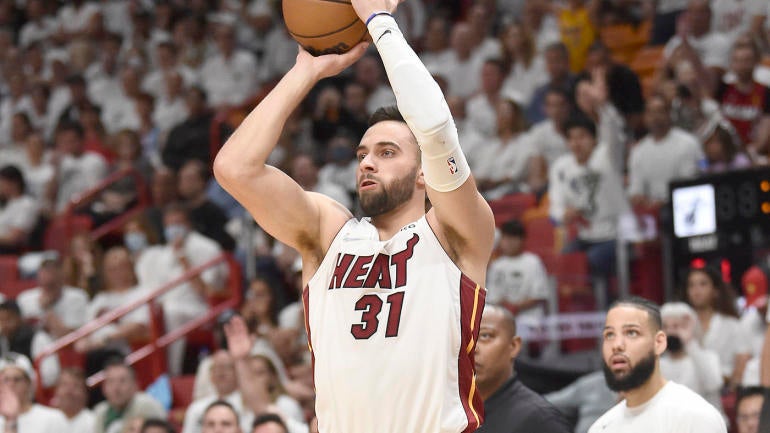
Rarely can a single play in the third quarter drastically impact the outcome of a playoff game, but a shot by Max Strus in Game 7 of the Eastern Conference finals between the Miami Heat and Boston Celtics might have been an exception. At the 11:04 mark in the third quarter, Max Strus sank a 3-pointer that cut a deficit that had once gotten as high as 17 down to two. Nearly three minutes later, with Robert Williams III about to take a free throw, an announcement could be heard in the background.
The 3-pointer made by Strus had been wiped off of the board. Miami’s young sharpshooter stepped out of bounds on the play. When Williams went to the line, the Celtics were up eight. When he made his second free throw, they were up 13.
The review itself was unusual. While officials will often use replay to turn a 3-pointer into a 2-pointer minutes after the fact, it’s exceedingly rare that a shot is wiped off of the board completely. Here’s what makes the Strus shot even stranger: It’s not fully clear that he even stepped out of bounds:
Keep an eye on that left heel. It is certainly hovering about the line … but does it actually touch it? I don’t know. The answer is maybe … or probably? A typical NBA game has plenty of “maybes” scattered throughout. Its an inevitability in a game with so many judgment calls. But “maybes” aren’t supposed to change calls. Replay is supposed to be used only when there is clear visual evidence that the call on the floor was incorrect. Subjectively speaking, that doesn’t look clear enough for an overturn. Heat coach Erik Spoelstra said he was “in shock” over the call.
“The fact that it happened four, five minutes later in game time, it does change the context of how you play. … If it happens like that, it should happen immediately and then you can adjust accordingly.” Spoelstra said.
The entire context of how Miami and Boston played down the stretch prevents us from truly knowing how impactful the call was. Boston won the game by four points. Take away three and they’re still theoretically up one, but the entire end of the game changes if the Heat have three more points. Maybe Boston doesn’t slow everything down in its final possessions to kill clock if it feels a more pressing need to add points. Of course, Jimmy Butler likely doesn’t pull up for 3 on a critical possession in the final minute if the Heat are up one in that scenario instead of down two.
Spoelstra ultimately conceded that the call itself wasn’t solely responsible for the loss. “I’m not crying or whining,” Spoelstra said. “Come on. We got beat.” In the end, he’s right. Judgment calls affect every NBA game. It’s up to both teams to respond to them as best they can. Boston did that. Miami didn’t. That’s why the Celtics are going to the NBA Finals.


